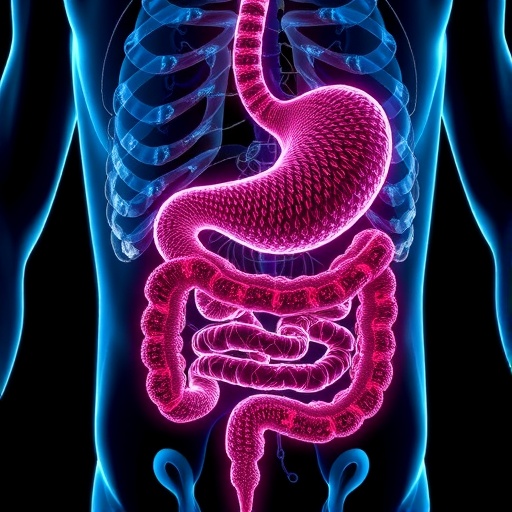In a groundbreaking study emerging from the University of Victoria, researchers have identified a promising new frontier in the treatment of major depressive disorder (MDD) by targeting what might be considered an unlikely player in psychiatric illness: the gut. Recent findings published in the journal Chronic Stress demonstrate that a naturally occurring glycoprotein known as Reelin might hold the key to simultaneously healing the damaged intestinal barrier often described as “leaky gut” and alleviating symptoms of severe depression. This dual action positions Reelin as a potentially revolutionary therapeutic agent in the intricate gut-brain axis.
The gastrointestinal tract, encompassing the stomach, intestines, and colon, serves as a complex barrier controlling the entry of nutrients into the bloodstream. This protective function is critical to maintaining bodily homeostasis. However, chronic psychological stress and stress-associated disorders like MDD can disrupt this barrier’s integrity, rendering it hyperpermeable—a condition colloquially termed “leaky gut.” The ensuing permeability allows bacteria and toxins, which are ordinarily sequestered within the gut lumen, to leak into systemic circulation. This leakage provokes immune responses and chronic inflammation, which are well-established contributors to the worsening of depressive symptoms. The interplay between the gut barrier and brain health underscores the pathophysiological foundation for novel treatments aimed at restoring gut integrity as a means to combat depression.
Central to this innovative research is Reelin, a multifunctional protein ubiquitously expressed in vital tissues including the brain, liver, blood, and the intestines. Known broadly for its role in neural migration and synaptic plasticity in the brain, Reelin has recently been implicated in the maintenance and renewal of the gut’s epithelial lining. The current study, led by Professor Hector Caruncho, set out to elucidate the impact of chronic stress on endogenous Reelin expression in the small intestine and investigate whether exogenous administration of Reelin might reverse stress-induced gut barrier dysfunction.
Experimental models exposed to chronic stress conditions revealed a significant depletion of Reelin within their intestinal epithelium. This depletion corresponded with increased epithelial cell apoptosis—a process of programmed cell death detrimental to the continuous renewal of the gut lining. Remarkably, a single intravenous injection of 3 micrograms of Reelin was sufficient to restore Reelin levels in the gut and markedly reduce epithelial apoptosis. These results provide compelling evidence that Reelin supplementation can re-establish the structural integrity of the gut lining following the insult of chronic stress.
This research builds upon previous findings demonstrating that depressive patients and chronically stressed rodents have diminished Reelin amounts in the brain, implicating a systemic reduction in this protein as a potential contributor to mood disorders. Intriguingly, identical doses of Reelin administered intravenously in rodent models have elicited rapid antidepressant-like behavioral effects, further linking Reelin’s pleiotropic roles across different organ systems. These dual observations emphasize Reelin’s enigmatic but pivotal position at the interface of neurobiology and gastroenterology.
The gut lining is a remarkably dynamic tissue, continuously replenishing itself every four to five days to counteract the constant exposure to harsh luminal factors such as digestive enzymes, acids, and the microbiome’s metabolites. Maintaining the tight junctions and epithelial cell viability is essential to prevent pathological permeability. Reelin appears to play a significant role in orchestrating these renewal processes by modulating epithelial cell turnover, thereby acting as a biological safeguard against leaky gut.
Inflammation resulting from gut barrier compromise is a notable amplifier of depressive symptomatology, mediated through systemic immune activation and neuroinflammatory cascades. By enhancing gut lining regeneration and reducing epithelial cell death, Reelin potentially mitigates this vicious cycle of inflammation-induced depression. This mechanism presents an innovative therapeutic paradigm that addresses the gut-brain axis’s bidirectional pathophysiology, rather than focusing solely on neurotransmitter modulation traditionally targeted by antidepressants.
While these exciting results chart a promising course, several challenges remain before Reelin-based treatments can transition into clinical practice. Further studies are necessary to optimize dosing regimens, determine long-term safety profiles, and understand Reelin’s pharmacodynamics and pharmacokinetics in humans. Moreover, elucidating how Reelin interacts with the gut microbiome and systemic immune responses will be critical in fully capitalizing on its therapeutic potential.
Importantly, this research highlights the growing recognition of psychiatric conditions such as depression as multisystem disorders, where peripheral factors like gastrointestinal health significantly influence central nervous system function. This integrative approach resonates with the broader United Nations Sustainable Development Goal (SDG) No. 3, emphasizing good health and well-being through interdisciplinary and systemic perspectives.
The study was made possible through funding support from the Canadian Institutes of Health Research (CIHR) and the Natural Sciences and Engineering Research Council of Canada (NSERC), reflecting the value placed on cutting-edge investigations into complex chronic diseases. The Caruncho Lab continues to advance this line of inquiry, with hopes that Reelin-based therapeutics could one day revolutionize treatment strategies for individuals suffering from both depression and gastrointestinal conditions.
As the scientific community advances toward more holistic understandings of mood disorders, the promising implications of Reelin’s role position it not simply as a protein of interest but a beacon of hope for new, multifaceted treatments. This research helps illuminate the path forward where mental health therapeutics may transcend conventional boundaries by harnessing the power of the gut-brain connection.
Subject of Research: Animals
Article Title: An Intravenous Injection of Reelin Rescues Endogenous Reelin Expression and Epithelial Cell Apoptosis in the Small Intestine Following Chronic Stress
News Publication Date: 29-Sep-2025
Web References: https://journals.sagepub.com/doi/full/10.1177/24705470251381456
References: DOI 10.1177/24705470251381
Keywords: Reelin, leaky gut, depression, major depressive disorder, gut-brain axis, chronic stress, glycoprotein, epithelial renewal, apoptosis, inflammation, intravenous injection, antidepressant mechanisms
Tags: chronic stress and intestinal barrierdual action of Reelin proteinglycoprotein research in psychiatrygut-brain axis in depressioninflammation and depression connectioninnovative approaches to MDD treatmentleaky gut and mental healthmajor depressive disorder treatmentpsychological stress effects on gut healthReelin protein for gut healingtherapeutic agents for gut repairUniversity of Victoria study on depression





